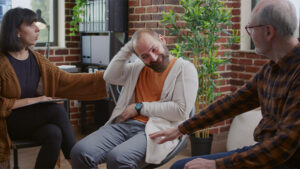“Feel Better, Now” – Provided by Aayu Clinics, trusted primary care and mental health services in Chicago.
Can ADHD Make You Tired?
Yes, ADHD can make you tired. People with ADHD often feel mentally and physically exhausted due to constant effort to focus, poor sleep quality, emotional regulation challenges, and the side effects of medications. According to a 2021 study in Frontiers in Psychology, over 60% of adults with ADHD reported chronic fatigue compared to only 16% in the general population (PubMed).
At Aayu Clinics in Chicago (Lakeview, Lincoln Park, Wicker Park, Ukrainian Village, Near River North), many patients share stories of burnout, brain fog, and tiredness despite sleeping full nights. Understanding the reasons ADHD makes you tired is the first step to effective management.
What Is the Best Way to Handle ADHD?
The best ways to handle ADHD involve a comprehensive approach combining medical treatment, therapy, lifestyle changes, and structured support.
Evidence-based management strategies include:
- Medication – Stimulants (Adderall®, Ritalin®) or non-stimulants (Strattera®, guanfacine) to regulate focus.
- Behavioral therapy – Cognitive Behavioral Therapy (CBT) helps with coping strategies.
- ADHD coaching – Building organization, task management, and accountability.
- Sleep optimization – Consistent schedules improve attention and reduce fatigue.
- Exercise and nutrition – Regular physical activity boosts dopamine; balanced meals maintain energy.
- Support systems – Family, peer groups, and professional counseling.
Expert Insight: Dr. Russell Barkley, ADHD researcher, notes: “ADHD management is not about curing symptoms but building systems that reduce impairment.”
What Is the 20 Minute Rule for ADHD?
The 20-minute rule is a productivity strategy designed to overcome procrastination. People with ADHD often struggle with task initiation, not just task completion.
How it works:
- Commit to doing a task for just 20 minutes.
- After 20 minutes, you can stop—or often, momentum carries you forward.
- This leverages reduced overwhelm and the brain’s reward system.
Example:
- Instead of “clean the whole apartment,” commit to “clean for 20 minutes.”
- Instead of “study all night,” commit to “read for 20 minutes.”
Why it works:
- Breaks down big tasks.
- Creates achievable wins.
- Builds consistency.
Many patients at Aayu Clinics in Chicago use this method alongside coaching, with positive results in daily functioning.
What Is the 30% Rule in ADHD?
The 30% rule, coined by Dr. Russell Barkley, explains that individuals with ADHD often operate at about 30% behind their chronological age in self-regulation and executive function.
Practical meaning:
- A 15-year-old with ADHD may function more like a 10-year-old in self-control and organization.
- Adults may require more support structures than their peers.
Implications for care:
- Expectations should be adjusted for development, not just age.
- Parents, teachers, and employers must adapt support systems accordingly.
This rule helps reduce frustration and stigma by framing ADHD as a developmental delay, not laziness.
What Are the 5 C’s of ADHD?
The 5 C’s of ADHD are principles often used in parenting and teaching strategies:
- Consistency – Predictable routines help ADHD brains thrive.
- Clarity – Clear, simple instructions prevent overwhelm.
- Calmness – Regulating adult responses reduces emotional escalation.
- Concreteness – Specific, tangible goals are easier to follow.
- Celebration – Recognizing small wins boosts motivation.
At Aayu Clinics, clinicians encourage parents in Chicago neighborhoods like Lakeview and Wicker Park to use the 5 C’s at home, reinforcing ADHD treatment with structured parenting approaches.
Does Caffeine Help ADHD?
Caffeine is a mild stimulant that affects the same neurotransmitters (dopamine, norepinephrine) targeted by ADHD medications.
Potential benefits:
- Increased alertness.
- Temporary boost in focus.
- Reduced fatigue in some individuals.
Limitations:
- Effects are weaker than prescription stimulants.
- May cause jitteriness, anxiety, or insomnia.
- Tolerance develops quickly.
A 2020 meta-analysis in Neuroscience & Biobehavioral Reviews found caffeine may modestly improve ADHD symptoms but is not a substitute for medical treatment.
👉 At Aayu Clinics Chicago, caffeine use is discussed as a complementary strategy, not a primary therapy.
Is ADHD a Form of Autism?
No, ADHD is not a form of autism. They are separate conditions but share overlapping symptoms.
- ADHD – Focus, impulsivity, hyperactivity, executive function challenges.
- Autism Spectrum Disorder (ASD) – Social communication difficulties, restricted interests, sensory sensitivities.
Overlap:
- Both can involve emotional regulation difficulties.
- Both may present with learning challenges.
- Co-occurrence is common (up to 50% of individuals with ASD also meet ADHD criteria).
Expert View: Dr. Thomas Frazier (Cleveland Clinic) explains: “ADHD and autism share traits but are distinct conditions requiring different intervention strategies.”
At Aayu Clinics in River North and Lincoln Park, patients are screened for both ADHD and ASD when symptoms overlap.
Practical Tips to Manage ADHD-Related Fatigue
Since ADHD can make you tired, here are practical steps to restore energy:
- Improve sleep hygiene – consistent bedtime, screen limits, calming rituals.
- Plan rest breaks – use the 20-minute rule to pace energy.
- Exercise daily – even 20–30 minutes improves alertness.
- Balanced nutrition – avoid sugar crashes; eat protein-rich meals.
- Therapy and coaching – manage stress and emotional fatigue.
- Medical care – medication adjustment if fatigue is severe.
Local Chicago ADHD Care
📍 Aayu Clinics (Lakeview, Lincoln Park, Wicker Park, Ukrainian Village, Near River North)
- ADHD evaluations and management.
- Primary care and mental health integration.
- Personalized treatment plans for fatigue, focus, and emotional balance.
Patients across Chicago trust Aayu Clinics for comprehensive ADHD care that addresses both focus and energy.
Conclusion
So, what are the best ways to manage ADHD?
- Combine medical treatment, therapy, coaching, and lifestyle adjustments.
- Use strategies like the 20-minute rule, 30% rule, and 5 C’s.
- Understand overlapping conditions like autism.
- Explore complementary supports like caffeine.
- And most importantly—acknowledge that ADHD can make you tired, but effective strategies can restore focus and energy.
FAQs: What Are the Best Ways to Manage ADHD?
1. Can ADHD really cause fatigue?
Yes—ADHD brains expend more energy on focus and emotional regulation, often leading to exhaustion.
2. What is the 20-minute rule in ADHD?
It’s a strategy to start tasks in manageable chunks of 20 minutes, reducing overwhelm.
3. How does the 30% rule apply to adults with ADHD?
Adults may function 30% “behind” their peers in executive function, requiring extra support.
4. Are caffeine or coffee safe for people with ADHD?
Yes in moderation, but they are less effective than prescribed medications.
5. Where can I find ADHD care in Chicago?
Aayu Clinics offers expert ADHD treatment in Lakeview, Lincoln Park, Wicker Park, Ukrainian Village, and River North.





